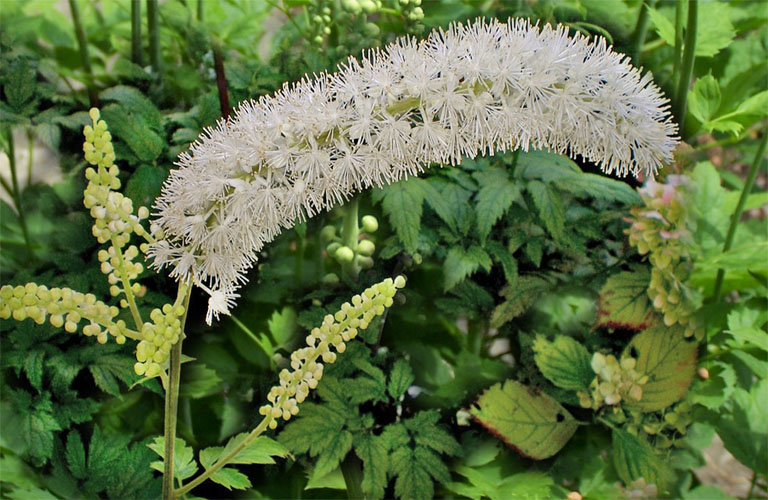Herbs
BLACK COHOSH
Black cohosh (Actaea racemosa or Cimicifuga racemosa) is member of the buttercup family native to North America, mostly across Canada and the eastern United States, as far south as Florida. Other (mostly historical) names for this herb include snakeroot, black bugbane, rattleweed, macrotys, squawroot, and rheumatism weed. Black cohosh has a long history of use.
Long before it was available as a supplement, Native Americans used black cohosh to help relieve menstrual and menopausal symptoms like cramps, menstrual irregularities, and hot flashes. European settlers used black cohosh as a tonic to support women's reproductive health and sluggish labor. As a result, this herb has reputation of being for women. Natives also used black cohosh to treat musculoskeletal pain, fever, cough, sore throat, pneumonia, kidney ailments, and sore throat. Black cohosh was also given as a treatment for insomnia, nervousness, fatigue and depression.
MEDICAL USES: This powerful herb is most commonly used for menopausal symptoms, including hot flashes (also called hot flushes) and night sweats (together known as vasomotor symptoms), vaginal dryness, heart palpitations, tinnitus, vertigo, sleep disturbances, nervousness, and irritability. Black cohosh is recommended for women of all ages: those who have painful periods and those troubled by menopausal symptoms. At menopause, black cohosh can ease many of the symptoms without the side effects some women experience with hormone replacement therapy (HRT). Black cohosh is not associated with increased risk of breast or endometrial cancer. Black cohosh is also good for women who suffer terrible emotional ups and downs in connection with menstruation like PMS-related problems such as depression, irritability and nervousness.
Today, many studies have documented black cohosh's effectiveness in the treatment of premenstrual symptoms and menopause. Germany's Commission E considers black cohosh effective for treating PMS and painful periods, as well as nervous conditions associated with menopause. A drug made from a derivate of black cohosh, remifemin, is used to treat hot flashes, night sweats and mood swings. However, some studies suggest black cohosh medicinal properties may extend further. Although more research is needed, preliminary studies suggest black cohosh may help with osteoarthritis and rheumatoid arthritis, as well as osteoporosis. Furthermore, anti-inflammatory salicylates in the powdered root can help relieve external rashes and sores.
How to use it
Black cohosh is available in tinctures, capsules and dried preparation (dried root) that can be made into tea.
Tea: 1 tablespoon of dried root, covered with boiling water. Steep covered, for about 10 minutes before use.
Tincture: 1 teaspoon a day.
Capsules: Usually 40 mg a day.
Related information:
- Terms Relating to Herbal Medicine
- Herbs
- Herbal Medicine Black Cohosh Root
- Black Cohosh Actaea Racemosa (Cimicifuga Racemosa)
- Actaea Racemosa (Black Cohosh)
- Black Cohosh
- Black Cohosh for Menopause Symptoms
- Uses and Side Effects of Black Cohosh for Menopause
- Black Cohosh Root
- Nutrition
- Nutrition Articles

Possible Side Effects:
Black cohosh has some potential side effects, but they’re typically mild (occasional stomach discomfort, nausea, skin rashes). Other side effects that have been noted are low blood pressure, headache, dizziness and allergic reactions. Large, long-term studies have not yet been done to confirm whether long-term use of black cohosh is safe.
Black cohosh should not be used during pregnancy or while you are breastfeeding.
Black cohosh should not be combined with birth control pills, hormone therapy, or tamoxifen.
Do not take black cohosh if you have liver disease or are taking any other supplements or medications that may harm your liver. If you develop symptoms of liver trouble, such as abdominal pain, dark urine, or jaundice, while taking the supplement, you should discontinue use and contact your health care provider.
NOTES: Because black cohosh has not been extensively studied, you may experience some side effects that are not yet widely known. If you have any concerns, it is always a good idea to discuss the use and side effects of this herb with a professional health care provider.
Black cohosh was once classified with the Genus name Cimicifuga but today the Genus name Actaea is considered the correct scientific name.
In Germany, the German Commission E has approved black cohosh as a treatment for premenstrual discomfort or dysfunction (dysmenorrhea), and for menopausal symptoms such as hot flashes, heart palpitations, nervousness, irritability, sleep disturbances, tinnitus, vertigo, perspiration, and depression (American Botanical Council 2002, Blumenthal 1998). The recommended dosage is 40 mg per day of crude drug (Blumenthal 1998, Liske and Wüstenberg 1998). Because of the lack of long-term safety studies, it is recommended that the use of black cohosh be limited to a maximum of 6 months (American Botanical Council 2002, Blumenthal 1998).
The use of medicinal plants stretches back to the earliest civilizations.
Avoid Negative Interactions
There may be negative interactions associated with some dietary supplements and other medicines you are taking. Consult a health care provider before using any dietary supplement.
Talk with a health care provider before using a dietary supplement. This is a good idea, especially for certain population groups. If you are pregnant, nursing a baby, or have a chronic medical condition such as diabetes or heart disease, be sure to consult your health care provider or pharmacist before purchasing or taking any supplement.
Inform your health care provider about all the supplements you use, especially before surgery. Some supplements can have unwanted effects during surgery. You may be asked to stop taking these products at least 2-3 weeks ahead of the procedure to avoid potentially dangerous interactions. These interactions could cause changes in heart rate or blood pressure, increased bleeding, or other problems that could adversely affect the outcome of your surgery.
Know that some supplements may interact with prescription and over-the-counter medicines. Taking a combination of supplements or using these products together with medications (whether prescription or OTC drugs) could produce adverse effects, some of which could be life-threatening.
For example: Coumadin (a prescription medicine), ginkgo biloba (an herbal supplement), aspirin (an OTC drug), and vitamin E (a vitamin supplement) can each thin the blood, and taking any of these products together can increase the potential for internal bleeding.
Ensuring quality - Many countries have regulations to provide more accountability in the manufacturing process and manufacturers are usually required to evaluate the identity, purity, quality, strength, and composition of dietary supplements, but it is very important to do your research and make sure you have confidence in the quality of the dietary supplement products that you purchase.





